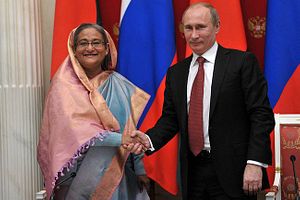Bangladesh’s decision to abstain from a UN resolution on the crisis in Crimea passed largely unnoticed, until the Russian envoy expressed his gratitude in return for Dhaka’s inaction at the United Nations.
Bangladesh was among 58 nations that abstained from the recent vote on the Crimea referendum at the UN General Assembly last week. Eleven nations favored the Russian position, while 100 voted to reaffirm Ukraine’s territorial integrity and sovereignty.
A grateful Russian ambassador rephrased the West’s “annexation of Crimea” as “reunification” while addressing a seminar held at the Bangladesh Institute of Strategic Studies on Sunday.
The next day, U.S. Ambassador Dan Mozena slammed Dhaka’s abstention. “I regret that Bangladesh was not able to join the majority on that important issue,” said Mozena during a press briefing at the American Club.
The response from the diplomatic community in Bangladesh was mixed. The Daily Star quoted one anonymous diplomat as saying, “It looks like they’re sitting on the fence, given the recent trend of leaning gradually towards Russia.” Yet some praised Dhaka’s show of independence.
Regardless, Bangladesh’s position on the Crimea resolution was hardly surprising.
Since its foundation, Bangladesh’s foreign policy has been guided by the principle “friendship to all, malice to none.” This was reflected in Dhaka’s enthusiastic participation in the Non-Aligned Movement (NAM). Even in its more recent history, Bangladesh has been reluctant to take sides when it comes to country-specific resolutions at the UN: it has abstained on resolutions concerning Bosnia, Georgia and Kosovo, for instance. Kosovo’s request for recognition as a sovereign state is still under consideration at Bangladesh’s Foreign Ministry. The Crimea abstention is merely a continuation of a long-term policy.
Another major factor is Bangladesh’s historic relations with Russia. The former Soviet Union vetoed—at least twice—U.S.-backed resolutions to intervene in Bangladesh’s war of independence against Pakistan in 1971. History might have been written very differently had that not happened. And Bangladesh remains grateful for Russia’s support.
Bilateral relations have strengthened in recent years, with the two nations inking several important deals. Moscow has granted Dhaka a $1 billion loan to purchase Russian military hardware. As part of this, Bangladesh’s armed forces will acquire armored vehicles, infantry weapons, air defense systems, and Mi-17 transport helicopters. In addition, Russia is helping Bangladesh build a 2000 MW nuclear power plant. The plant in Ruppur, which is the first of its kind in Bangladesh, is considered a milestone in tackling Bangladesh’s gargantuan power crisis. Aside from technical assistance, Russia is providing a loan of $500 million to offset the total construction cost of $2 billion.
Meanwhile, Russia’s state-owned Gazprom has been awarded contracts for drilling 10 wells in existing gas fields of Bangladesh. Both nations also enjoy healthy trade relations. Estimates put bilateral trade north of $700 million and Dhaka is hoping to boost that by seeking duty-free access to the Russian Federation market.
Russia-Bangladesh’s multifaceted cooperation extends into space, too. Moscow is mulling the possibility of helping Bangladesh launch a telecommunications satellite.
Given the strength of its ties with Moscow, it was never going to be easy for Dhaka to openly oppose Russia at the UN. At the same time, Sheikh Hasina’s government did not want to again irk Washington or London, especially after the strong reaction from the West in the wake of the January elections, in which Hasina’s party won a landslide victory in poll boycotted by the opposition.
At Monday’s briefing, Mozena reiterated that the U.S. position was that Bangladesh should hold fresh elections. In contrast, Russian President Vladimir Putin congratulated Hasina as soon as she took office.
So, no, Bangladesh’s position on the Crimea resolution should not have come as a surprise.
Arafat Kabir is a Bangladesh based analyst of regional and global affairs. His articles have appeared in outlets including The Wall Street Journal, The National Interest and International Policy Digest. Follow him @ArafatKabirUpol

































